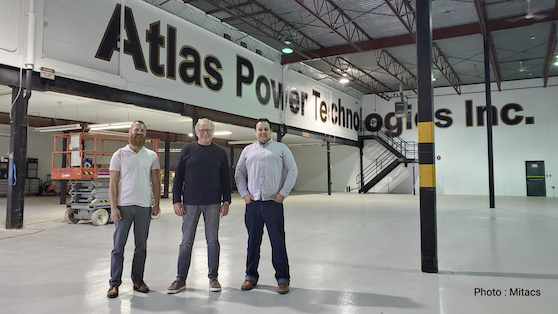
Articles
Cleantech
Features
Indigenous
Articles
Cleantech
Energy & Power
Energy Storage
Profiles
Indigenous-led Atlas Power Technologies poised to revolutionize energy storage
February 16, 2022 | By Anthony Capkun
 From left: Atlas Power Technologies’ Dean Hedman, director and chief construction officer; Brooke Wade, chair of the board of directors; Mitchell Miller, CEO and director. Photo: Mitacs.
From left: Atlas Power Technologies’ Dean Hedman, director and chief construction officer; Brooke Wade, chair of the board of directors; Mitchell Miller, CEO and director. Photo: Mitacs. February 16, 2022 – Energy start-up Atlas Power Technologies has announced that its supercapacitor manufacturing facility—currently under construction in Abbotsford, B.C.—is on track to be up and running before the end of the year.
“We’re accelerating the clean technology transition timeline by taking the most-mined products today that nobody wants and turning them into a high-value, clean technology,” said Mitchell Miller, CEO, Atlas Power.
Using technology first developed at the University of British Columbia, and in partnership with Mitacs, Atlas Power’s process takes abundant materials (like mined thermal coal and/or petroleum coke) and refines them to make high-grade, activated carbon—a component of supercapacitors.
“A supercapacitor is a type of capacitor that can store a large amount of energy, typically 10x to 100x more energy per unit mass or volume compared to electrolytic capacitors. It is preferred to batteries owing to its faster and simpler charging, and faster delivery of charge.” – Techopedia
So far, the technology’s application has been limited by high cost and low performance, explains Mitacs. Atlas Power aims to change that.
“We’re solving one of the biggest challenges of the clean energy transition, which is How do we store renewable energy, efficiently and cost-effectively?” Miller said, whose technology is suitable for large-scale grid, utility and commercial applications.
Miller’s path toward founding Atlas involved collaborating with researchers at Simon Fraser University and UBC, along with the help of Mitacs. He eventually tapped into the Mitacs Indigenous Pathways program to hire student interns to help advance his ideas.
He says his Métis heritage is part of what drives him to find ways to add value to the world around him. What started as a small project to investigate a concept led to a breakthrough innovation that is performing 10 times better than existing supercapacitors today, he explained.
“When you think about renewable energy going onto the grid, the amount of energy storage we have to produce is enormous, and there’s simply no clear path to get there with existing chemistries,” said Miller. He explained that competing storage technologies rely on scarce minerals, such as nickel, cobalt, graphite and lithium, which means new mines will need to be commissioned—a process that costs billions and will take decades.
“I get up every day knowing that, if we do our job correctly, the world will be a better place for my kids, and that’s a nice way to start the day,” he said.
To date, Atlas Power Technologies has hired three Mitacs interns, and has secured more than $400,000 in Mitacs funding. Prof. Jason Jiacheng Wang, who led the SFU research team, now serves as Atlas Power Technologies chief technical officer.
“Without Mitacs, we literally would not be where we are today,” said Miller. “We were able to outsource our research and development to the university at an affordable rate, and that’s what allowed us to push forward.”
UBC Okanagan School of Engineering assistant professor Jian Liu is supervising the UBC team of Mitacs interns working on the project.
“We’re involved in many industrial collaborations, and they don’t always get this far,” said Liu. “Not only did this project go better than I ever expected, but our partner is now building their manufacturing capability right here in Canada, and that’s very important. They will be helping to grow the local economy, and that’s much more important to me than the innovation itself.”
Candice Loring, business development director, Indigenous Community Engagement with Mitacs, calls the Atlas Power Technologies trajectory an incredible Indigenous-led business success story.
“I’m thrilled to bring this research under our new Indigenous pathways stream,” Loring said. “It’s my hope that this funding program becomes a standard offering to ensure equitable access to entrepreneurs and scholars, and to support collaborative innovation.”
Mitacs is a not-for-profit organization that fosters growth and innovation in Canada by solving business challenges with research solutions from academic institutions. It is funded by the Government of Canada and provincial partners.
— With files from Mitacs
You’ll find all our Back Issues in the Digital Archive.
Print this page
